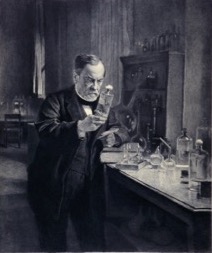
Science knows no country, because knowledge belongs to humanity, and is the torch which illuminates the world.
- Louis Pasteur
This month marks the 200th Anniversary of the birth of Louis Pasteur, the Father of Immunology and Vaccinology, one of the formulators of Germ Theory, a giant and hero of the public health, to his nation, France, to Europe and to the world. We owe him an enormous debt of gratitude. His life and work and legacy are celebrated in a series of papers in the December 17th edition of the Lancet. The editorial can be found here and a paper on the legacy of the Pasteur Institutes here. The challenges of vaccinology, the delivery of vaccines to whole populations and the acceptability of vaccines across the globe remain. Rabies still kills one person every ten minutes. The old challenges remain as the new ones we have seen with COVID-19 emerge.
The vaccine skeptics of 19th Century France convey the same doubts as modern day anti-vaxxers, about vaccines being unsafe, unnatural or toxic interventions. Unequal vaccine availability and commercial protection of intellectual property remain challenges, not just with COVID-19 vaccines. Production of vaccines can be more distributed- it is a neo-colonial view that ‘quality cannot be assured in low or middle income countries’—India is the world’s biggest producer of vaccines; African production is limited but the potential is there. To overcome grotesque inequalities in vaccination availability, especially in Africa, there must be more widescale production. It is the limitation of production that creates scarcity which maintains profit. This is a way to make money but let people die—it is grotesque, inadequate, inhuman. The Lancet also highlights Pasteur’s commitment to communication of science with the public and to being a visible figure and champion of the science he believed in. In the global context these are skills we need to nurture with care and courage. Information is no longer just a power from above, from the expert, it is with the commentators, pundits, and influencers, for whom knowledge is inconvenient, or optional, and unnecessary for their followers. We need to understand this world better, be true to our science, but wise to new realities of tribalism, group think and industrialised disinformation.
Last year I reflected on the state of vaccination from local to global in a presentation for Spanish public health and industry representatives. You may be interested to watch here and the slideshow can be viewed here. I also added my voice to the widely held view that vaccinations alone could not prevent COVID-19 and that we needed a ‘vaccines plus’ approach. The ASPHER statement on the Trade Related Intellectual Property Rights waiver was adopted by the Global Network for Academic Public Health and by the World Federation of Public Health Associations.
Perhaps Pasteur’s most famous quote, is ‘Science knows no country, because knowledge belongs to humanity, and is the torch which illuminates the world’. Schools of public health are custodians of that science and knowledge and we must share our knowledge wisely, but freely and widely. We must also see increased investment in the business of teaching public health. It is still the case that the pandemic will not be over until it is over for everyone. We must continue to argue for free, equal production and distribution of vaccines in all parts of world. We must continue to ensure our health professionals are skilled and knowledgeable to deliver vaccines with confidence and understanding with the people they seek to protect. We must ensure the public we serve are knowledgable and confident in our services and the vaccines we know can protect them.





